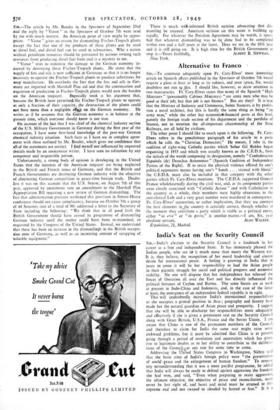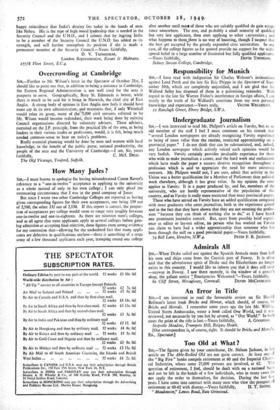India's Seat on the Security Council
SIR,—India's election to the Security Council is a landmark in her career as a free and independent State. It has immensely pleased the Indian people, who see its it much more than meets the Western eye. It is, they believe, the recognition of her moral leadership and sincere desire for international peace. A feeling is growing in India that in years to come it will be her responsibility to lead the Asian people in their gigantic struggle for social and political progress and economic stability. No one will dispute that her independence has released the forces of liberation all over the East and has directly influenced the political fortunes of Ceylon and Burma. The same forces are at work at present in Indo-China and Indonesia, and, in the case of the latter at least, the emergence of an independent federal republic is in sight. This will undoubtedly increase India's international responsibilities as she occupies a pivinal position in Asia ; geography and history have made her the natural guardian of Asian peace and prosperity. I suggest that she will be able to discharge her responsibilities more adequately and effectively if she is given a permanent scat on the Security Council along with Great Britain, U.S.A., France and the Soviet Union. I am aware that China is one of the permanent members of the Council, and therefore to claim for India the same seat might raise sonic awkward problems, but it must be admitted that China is at present going through a period of revolution and uncertainty which has given rise to legitimate doubts as to her ability to contribute to the delibera- tions of the Couneilvt any rate for some time to come.
Addressing the United States Congress in Washington, Nehru said that the basic aims of India's foreign policy were " the preservation of world race and the enlargement of human freedom." To remote any misunderstanding that it was a mere pacifist programme, he added that India will always be ready to defend against aggression the freedom she had won, and said, "Even when preparing to resist aggression, the ultimate objective, the objective of peace and reconciliation, must never be Jost sight of, and heart and mind must be attuned to this supreme end and not swayed or clouded by hatred or fear." It is a happy coincidence that India's destiny lies today in the hands of men like Nehru. His is the type of high moral leadership that is needed in the Security Council and the U.N.O., and I submit that by inviting India to be a member of the Security Council the U.N.O. has added to its strength, and will further strengthen its position if she is made a permanent member of the Security Council—Yours faithfully, D. V. TAHMANKAR,
London Representative, Kesari & Mahrarra. 177/8 Fleet Street, EC4-







































 Previous page
Previous page